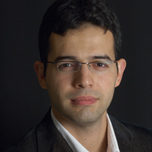Engineering Brain Activity Patterns for Therapeutics of Disorders

March 12, 2021 1:00-2:00 p.m.
Prof. Dr. Mehmet Fatih Yanik
Professur für Neurotechnologie
ABSTRACT: Brain networks are disrupted in numerous disorders. Existing treatment options often cannot address such complex dysfunctions. We first show that aberrant brain-wide activity patterns can be corrected by targeting distinct network motifs with multiple neuromodulators using a vertebrate model of human epilepsy and autism. Our systematic approach rescues behaviour unlike any other. With methods promising future therapeutic use, we next show how specific molecular targets in different brain circuits can be non-invasively and spatially targeted in mammals using focal drug aggregation and uncaging by ultrasound waves, and discuss how cortex-wide activity patterns can be captured chronically at single neuron resolution with minimal invasiveness in higher species.
BIOGRAPHY: Prof. Yanik received his BS and MS in Engineering and Physics at MIT in 2000, and PhD in Computational and Applied Physics at Stanford in 2006. He completed postdoctoral work in Stanford Bioengineering and Neurosurgery. He subsequently served as Assistant and later as Associate Professor till his tenure at MIT. He is currently a professor at ETH Zurich in the Institute for Neuroinformatics. His studies are recognized by NIH Director’s Pioneer Award, ERC Consolidator Award, NIH Director’s New Innovator Award, NIH Transformative Research Award, Packard Award in Engineering and Science, Alfred Sloan Award in Neuroscience, NIH Eureka Award, NSF Career Award, Silicon Valley’s Innovator’s Challenge Award, Technology Review Magazine’s “World’s top 35 innovators under age 35”, Junior Chamber International’s “Outstanding Young Person”, and others. His work has been highlighted by The Economist, Popular Mechanics, Nature, ABC, Boston Globe, Scientific American, MIT Technology Review, and others.




